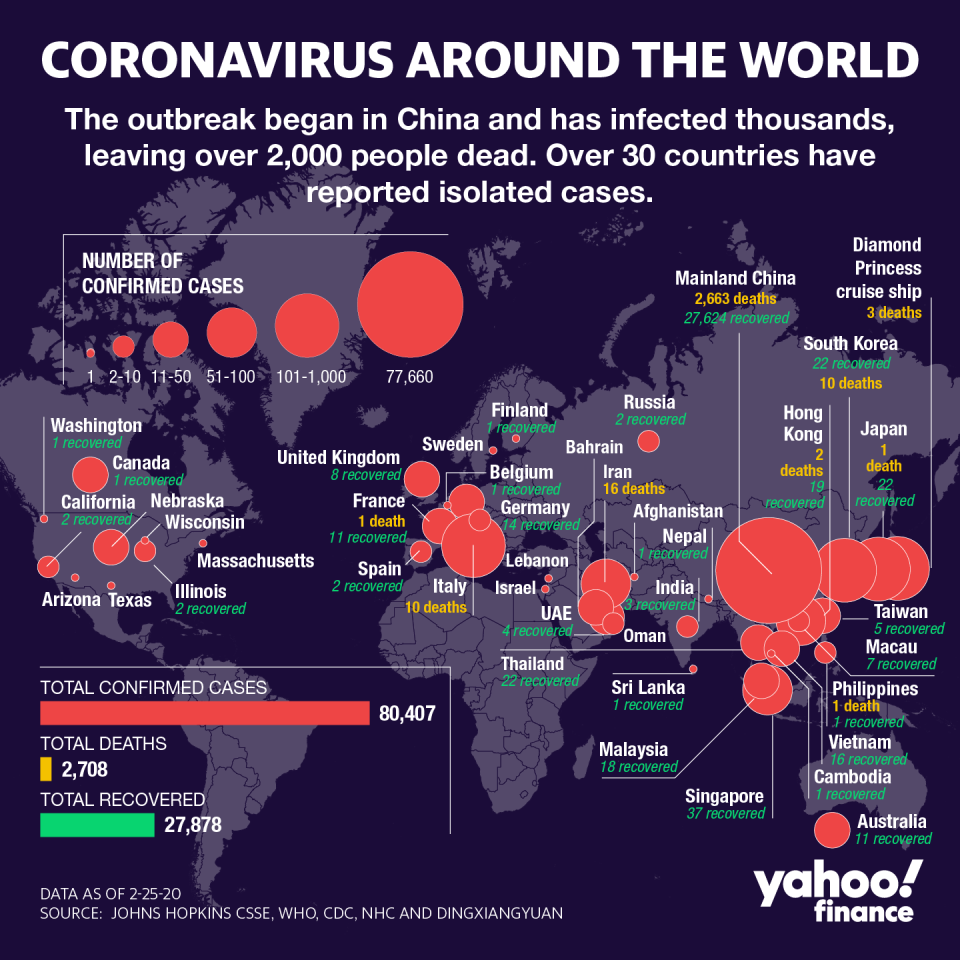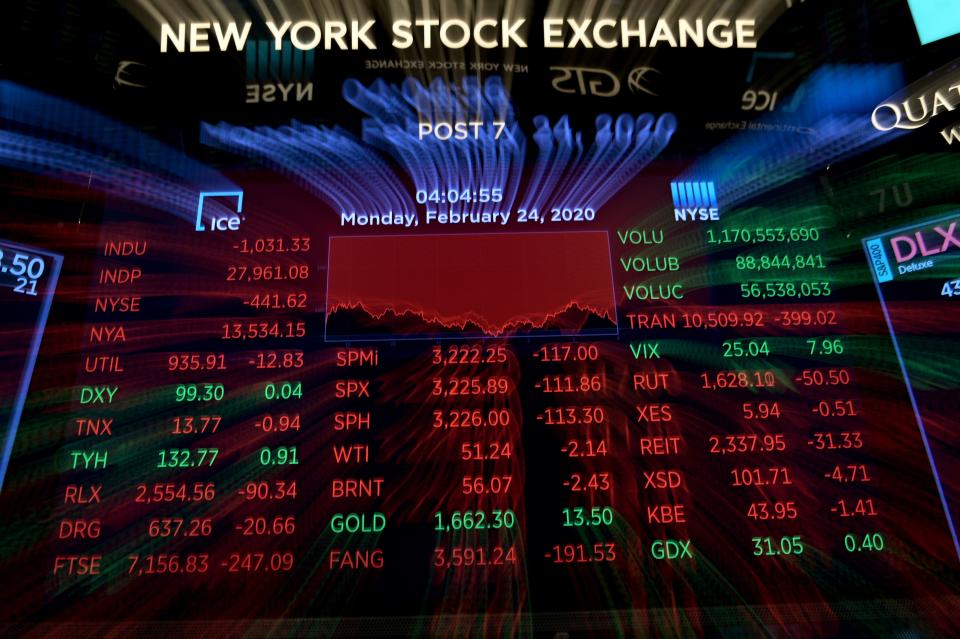Coronavirus latest: Stark CDC, WHO warnings add to global gloom: 'This could be bad'
Grim warnings on Tuesday from public health officials about the spread of the coronavirus coincided with new cases appearing across Europe, sparking a sell-off in markets and stirring new worries about a global pandemic.
China, the epicenter of the outbreak, continues to see a declining number of new cases. However, the outbreak has spread to South Korea, Japan, Italy and Iran.
Meanwhile, isolated infections in Austria, Croatia and Spain have added to global concerns about a worldwide emergency and weighed heavily on Wall Street, even though officials have downplayed the prospect of a pandemic.
At a daily news briefing, Nancy Messonnier, the Centers for Disease Control’s director of the National Center for Immunization and Respiratory Diseases, warned that the risk of the virus spreading domestically is on the rise — and could prove severely disruptive to everyday life.
“We are asking the American public to prepare for the expectation that this might be bad,” Messonnier told reporters, as the Trump administration stepped up its efforts to manage the virus’ after-effects.
Messonnier added it is no longer “a matter of if, but when” the virus spreads, and how many people in the country end up contracting a severe case of the virus.

U.S. Health and Human Services Secretary Alex Azar told lawmakers at a budget hearing Tuesday the department is requesting $2.5 billion in emergency supplemental funding, half of which would go directly to fund the outbreak response.
The spread of the outbreak is an “unprecedented...health care challenge, globally,” Azar said, pushing for more funding to conduct lab testing and field work.
To date, the pathogen has infected over 80,000 worldwide, causing more than 2,700 deaths. The U.S. has recorded 57 cases, most of which are related to evacuees from Asia, or the Diamond Princess cruise that was quarantined off of Japan for two weeks.
What’s happening in the market

U.S. benchmarks on Tuesday tried to claw back from the prior day’s ugly beating, but fell by over 2% after new cases popped up around the world, and Italy’s toll mounted. The S&P 500 (^GSPC) and Nasdaq (^IXIC) all hit their lowest levels since December, while the Dow’s (^DJI) two-day losses topped 1,500 points.
While travel and leisure have taken the brunt of the sell-off, tech stocks like Apple, Google and Tesla, among others, have been punished by investors.
On Tuesday, Federal Reserve Vice Chair Rich Clarida said the disruption in China could spill over to the rest of the global economy, but warned it was too early to quantify.
William Lee, the chief economist of the Milken Institute, told Yahoo Finance that when talking about the pathogen’s impact on tech giants, the markets should not be “overreacting, but they are,” Lee said.
Deepening concerns about the impact to global demand, and the worldwide supply chain, are weighing on multinational companies overall. The U.S. Food and Drug Administration reportedly contacted 20 pharmaceutical companies that are likely to be vulnerable to supply chain disruptions from China, the world’s largest source of active pharmaceutical ingredients.
“If production in an important American industry were to grind to a halt due to supply chain disruptions originating from abroad, then a domino effect could take hold in the U.S. industrial sector,” Wells Fargo analysts wrote in a research note on Tuesday, citing chemical, petroleum and coal as industries that would take a hit.
Some pharmaceutical names saw their stocks move amid hopes that a vaccine could be found. A clinical trial of coronavirus vaccines will begin in partnership with the National Institute of Health at the University of Nebraska — which include Gilead’s (GILD) remdisivir, HHS’s Azar told Congress.
Separately, Moderna (MRNA) got a 22% intraday boost from news that its vaccine candidate is set to be tested in the U.S.
But lawmakers were concerned that the list of needs HHS presented Tuesday would be hard to find and stockpile in time for an outbreak in the U.S., and criticized the diagnostic kits the CDC has sent to states.
Around the world
The U.S. and other countries took steps to limit or restrict travel to China, Hong Kong and other surrounding countries. On Monday, China announced restrictions on travel to the U.S., while Germany said it would keep its borders open as the virus spreads in Italy.
The outbreak has raised questions about whether the Olympics will go on in Tokyo this summer, as planned. Dick Pound, a key member of the International Olympic Committee told the Associated Press on Tuesday that organizers could cancel the iconic global event, rather than postpone or relocate it.
Bruce Aylward, WHO lead of the international experts mission in China said during a press briefing Tuesday that the world should prepare as if the coronavirus hits their country tomorrow.
The coronavirus “is going to come soon, potentially, you’ve got to be shifting to a readiness, rapid response thinking,” he said.
Meanwhile, reports of factories slowly ramping up operations and at least one-third of businesses open, including half of all Apple stores in China, has given some hope. Yet the damage to first quarter growth is likely to be substantial, analysts say.
Anjalee Khemlani is a reporter at Yahoo Finance. Follow her on Twitter: @AnjKhem
Read the latest financial and business news from Yahoo Finance
Follow Yahoo Finance on Twitter, Facebook, Instagram, Flipboard, SmartNews, LinkedIn, YouTube, and reddit.
